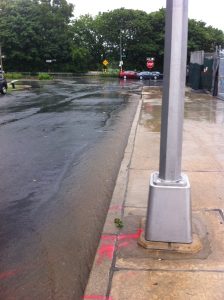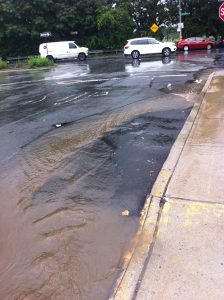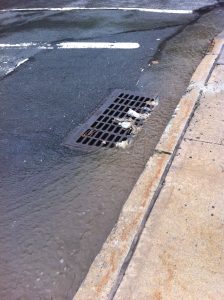The New York City Department of Environmental Protection (NYC DEP) is taking over the inspections and enforcement related to the New York State Department of Environmental Conservation’s (NYS DEC) Multi-Sector General Permit (MSGP) for Industrial Activities.

The DEP is notifying business owners now that industrial facilities must have a valid MSGP or No Exposure Certification if activities from such sites have a potential to discharge into nearby surface waters.
Currently there are only 30 industrial facilities within New York City that must comply with MSGPs requirements at their sites. Under the new agreement, the NYC DEP and DEP contractors will be inspecting facilities within the five boroughs to determine the potential for polluted stormwater to run off the site. Business owners in New York City can expect to receive the first notification letter by November 2018 warning them of the upcoming inspections. As of now, the inspections will be unannounced, with the intention to observe the facility during normal business operations and determine whether there is any stormwater runoff onto the City streets furnished with MS4 catch basins or to the surface waters potentially causing pollution. The number of facilities that will be required to apply for an MSGP is expected to rise as a result of this agency change.
 Combined Sewers vs MS4
Combined Sewers vs MS4
The new enforcement is a particularly important issue for businesses that are not connected to New York City’s Combined Storm and Sanitary Sewers. Combined sewers collect sanitary water from buildings (i.e. residences, businesses) as well as stormwater from gutters, yard drains, street catch basins, etc. Water from combined sewers gets treated before it is discharged to surface waters, except in cases of a combined sewer overflow, which is common during heavy rain events. Municipal Separate Storm Sewer Systems (MS4) do not treat water from storm sewers before it discharges directly into a water body.
Will your business be required to comply with the DEC MSGP requirements at your facility?
That depends on your site location, activities, maintenance, and topography.
- Facilities that use chemicals, including petroleum products like gas and diesel are targets for the regulatory agencies, since incidental leaks and minor spills are often part of the site operations.
- Some water bodies have specific pollutants of concern (POC) that are highly regulated. For example, in estuaries where suspended solids and Chemical Oxygen Demand (COD) are the pollutants of concern, the DEP will be checking facilities for heavy truck traffic and poor housekeeping practices as a potential source of total suspended solids pollution.
- Facilities located in area connected to MS4 are likely to be subject to the DEC MSGP. As an example, this form of sewers is very common in Staten Island.
- Some sites are sloped in a way to retain stormwater, while others are sloped to allow it to run off. Retaining stormwater on-site, however, does not allow a business to pollute the groundwater, it is just regulated under a different program. The United States Environmental Protection Agency (EPA) has authority to issue violations and/or orders of consent to any business that discharges pollutants to the groundwater under the Underground Injection Control (UIC) Program.
- Facilities that are fully paved, and do not allow leaching of rainwater into the subsurface, will allow more stormwater runoff than other sites with grass buffers, permeable pavement, planters, or gravel cover.
Unsure if your site needs a Multi-Sector General Permit? 
Give Walden Environmental Engineering a call at (516) 624-7200 to discuss your site operations. We can guide you towards business practices or infrastructure changes that prevent pollution on your site, or help you with the MSGP process if it makes more sense for your business to apply for a DEC Permit.


